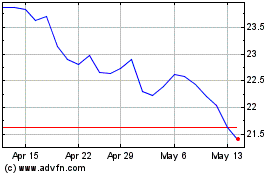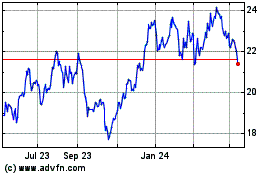2nd UPDATE: BlueScope Facing A$1 Billion Loss After Writedown
12 August 2011 - 5:25PM
Dow Jones News
Australia's largest steelmaker by output, BlueScope Steel Ltd.
(BSL.AU), said it will write off $900 million Australian dollars
(US$922 million) in assets and may cut its export capacity after
being squeezed by currency swings, high materials costs and low
product prices.
The news, which analysts say will likely bring about a A$1
billion full-year loss, is a further sign of the stresses being
placed on the country's economy by its once-in-a-generation mining
boom. A A$173.5 billion wave of resources investment due over the
next two years, plus the country's image as a safe-haven economy in
contrast to other struggling developed countries, has pushed the
Australian dollar to 28-year highs and driven up interest rates to
4.75%.
Manufacturers have been hit hard as a 24% strengthening in the
local currency against the U.S. dollar over the past two years has
made their exports uncompetitive and reduced the price of imports.
The country's largest beverage maker, Coca-Cola Amatil Ltd.
(CCL.AU), Tuesday blamed the high Australian dollar for its
decision to close a local food processing plant with the loss of
150 jobs.
In a statement to the Australian Securities Exchange, BlueScope
said the future of its export operations is in doubt. Exports
accounted for 59% of sales in the six months to the end of
December.
"The board is reviewing options to align BlueScope's domestic
steelmaking production capacity to Australian domestic market
demand. No decisions have been made," the Melbourne-based company
said.
Analysts have suggested the company abandon its export
operations and close one of the two blast furnaces at its Port
Kembla steel mill, located 60 miles south of Sydney. Such a move
would likely lead to significant job losses in the adjacent city of
Wollongong, where BlueScope is one of the largest employers.
"BlueScope has been a global anomaly in that it exports half of
its steel. There's a reason the Chinese only export about 5%, and
it's because you can't make money from it. Their exports are
bleeding money so they need to shut down one of the furnaces," said
Michael Slifirski, a Melbourne-based analyst at Credit Suisse.
BlueScope is the country's second-largest manufacturer by
revenues after packaging firm Amcor Ltd. (AMC.AU), but its current
unprofitability means its market value is just A$1.8
billion--barely half that of Lynas Corp. Ltd. (LYC.AU), a
rare-earths miner that has yet to make a trading profit.
The tribulations of BlueScope are emblematic of the changes that
have transformed the Australian economy over the past decade. Spun
out of BHP Billiton Ltd. (BHP)--now the world's largest mining
company--in 2002, it has been hit hard by the same rise in raw
materials prices that have buoyed both BHP's profits and the
Australian economy.
Each ton of steel requires around 1.5 tons of iron ore and 600
kilograms of coking coal. The prices of both have risen strongly in
recent years on the back of strong demand from Asian steelmakers,
especially in China.
Presenting BlueScope's half-year results in February, Chief
Executive Paul O'Malley said the cost of raw materials, which the
company largely buys from BHP, had risen to A$2.5 billion from
A$400 million in 2002. Profits would also improve by A$200 million
if the local currency fell back to the US$0.80 level it hovered
below for most of the past two decades, he said at the time. The
Australian dollar is currently trading at US$1.03 versus the
greenback.
Shares in the company slumped over the course of the day,
falling 7.7% to 91 Australian cents at the close of the market.
However, the company's peer OneSteel Ltd. (OST.AU), also spun out
of BHP in 2000, fell only 0.7% to A$1.38 and the broader
S&P/ASX 200 index closed up 0.8%. OneSteel owns iron ore and
coal mines, which partially insulate it from the economic stresses
faced by BlueScope.
Analysts expect BlueScope to make an underlying loss of A$102.2
million in the year to June 30, according to a Dow Jones Newswires
poll of six brokers. This would result in a A$1 billion reported
loss when the A$900 million writedown is included.
BlueScope said the writedown would come from reducing the
carrying values of its Australian coated and industrial products
division and its distribution business. Both units are being rolled
into the main steelmaking division and accounted for A$404 million
in goodwill between them, although the company did not offer
further details of how the writedown was calculated.
The revision was "accommodated within the company's financial
covenants with its lenders", BlueScope said. However, MF Global
analyst Andrew Gardner estimated the company only had enough
earnings to meet its interest payments twice over--an unusually
tight ratio.
BlueScope had net debt of A$912 million at 31 December 2010, and
drew down A$128 million of debt to pay interest, dividends, and
operating costs in the last six months of the year, according to
its half-year report. The company is due to report full-year
earnings August 22.
-By David Fickling, Dow Jones Newswires; +61 2 8272 4689;
david.fickling@dowjones.com
Bluescope Steel (ASX:BSL)
Historical Stock Chart
From Nov 2024 to Dec 2024

Bluescope Steel (ASX:BSL)
Historical Stock Chart
From Dec 2023 to Dec 2024
